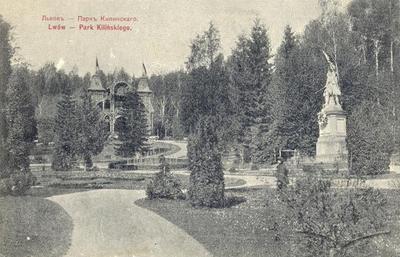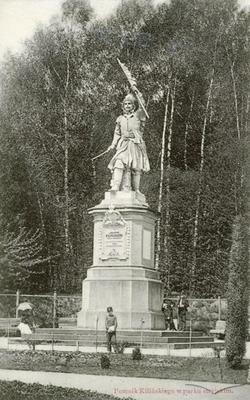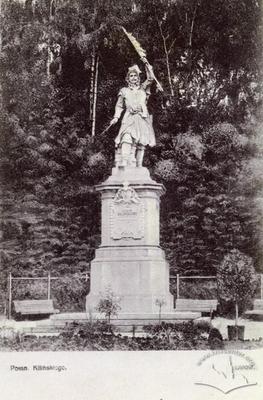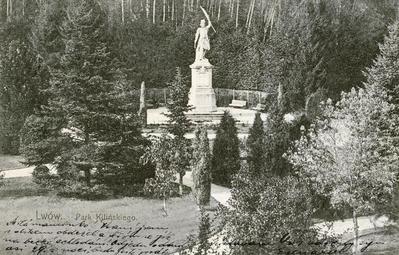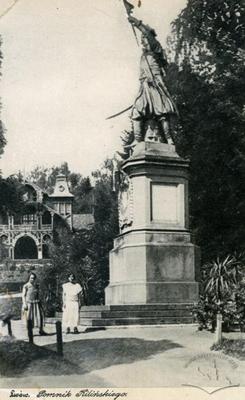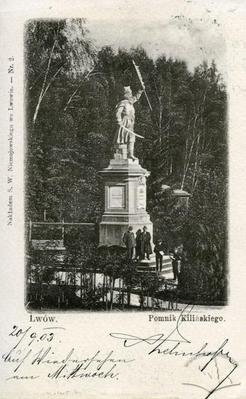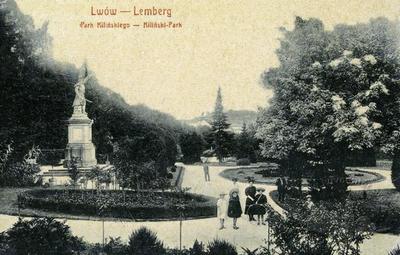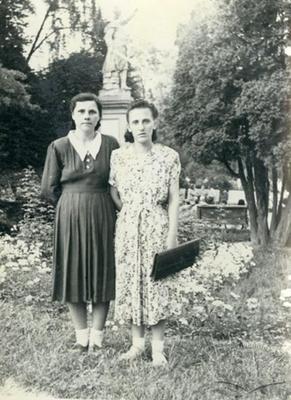Stryiskyi Park territory – monument to Jan Kilinski ID: 109
The monument to this participant in the uprising led by Tadeusz Kosciuszko was established on the initiative of Lviv craftsmen. The monument was designed by architect Julian Zachariewicz (1888) and made by sculptor Julian Markowski. It was established in 1895.
Story
Jan Kiliński was a Warsaw shoemaker, a participant in the uprising led by Tadeusz Kosciuszko in 1794. He was later named colonel of the Masovian militia (pol. milicja mazowiecka).The initiative to install such a monument arose among Lviv craftsmen. In particular, in 1888, the Committee of Craftsmen appealed to Piotr Gross, a deputy of the Galician Sejm and the Imperial Council in Vienna, asking him to assist in establishing a monument to Jan Kiliński. As a result, an artistic commission was created, which included architects and influential city officials: Julian Zachariewicz, Juliusz Hochberger, Walewski, Janowski, Andrzej Gołąb and Heppe) (Dziennik Polski, 1888, No. 209, 2). In the same year, the commission members reviewed a project proposed by Julian Zachariewicz and commissioned Julian Markowski, a well-known sculptor, to implement it. According to the project, Kiliński was to be depicted in full length, dressed in a kontush, with a sword in one hand, and a standard in the other hand. The four-meter statue was to stand on a six-meter pedestal and be surrounded by flowerbeds. For the monument, a place was chosen among summer houses, near a restaurant from where "the whole park and, further, the mound (pol. kopiec) and the Stryiska road" could be viewed. Funds for the monument were collected by "craft corporations" and partly from the city budget.
The committee for the monument construction, headed by Piotr Gross, included, in particular, Edward Mochnacki, Stanisław Niemczynowski, Głodziński, Walichiewicz, Michalski, Świsterski, Kłossowski, Mariański, Aleksandrowicz, Szydłowski, Piątkowski, and others (Dziennik Polski, 1888, No. 209, 2).
The construction of the monument was delayed for years; it was finally completed in 1895 (Dziennik Polski, 1895, No. 80, s.2). A year earlier, a General Provincial Exhibition was held in Lviv, dedicated to the centenary of the uprising led by Kosciuszko. In the upper part of the park, near the exhibition pavilions, a rotunda building was constructed to exhibit a panorama of the Battle of Racławice, in which Kiliński participated. The monument to the colonel was installed on the park's lower alley in 1895, and it was from that time on that the park became known as the Kiliński park.
The monument has survived to this day: due to the social aspect of Kiliński's biography, it was not dismantled by the Soviet administration.
In 2008-2009, the monument was restored on the initiative of the Polish Society for the Protection of Monuments (Siurawska, 2009).









